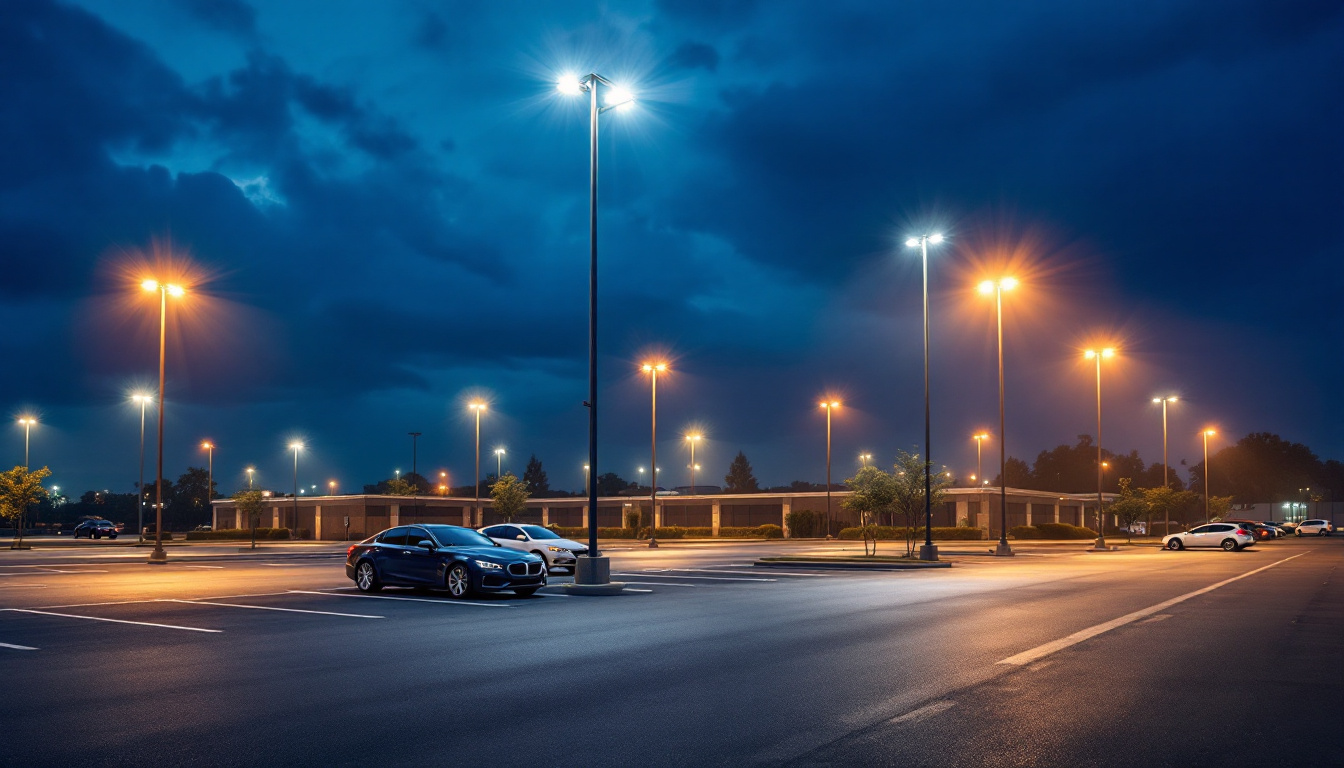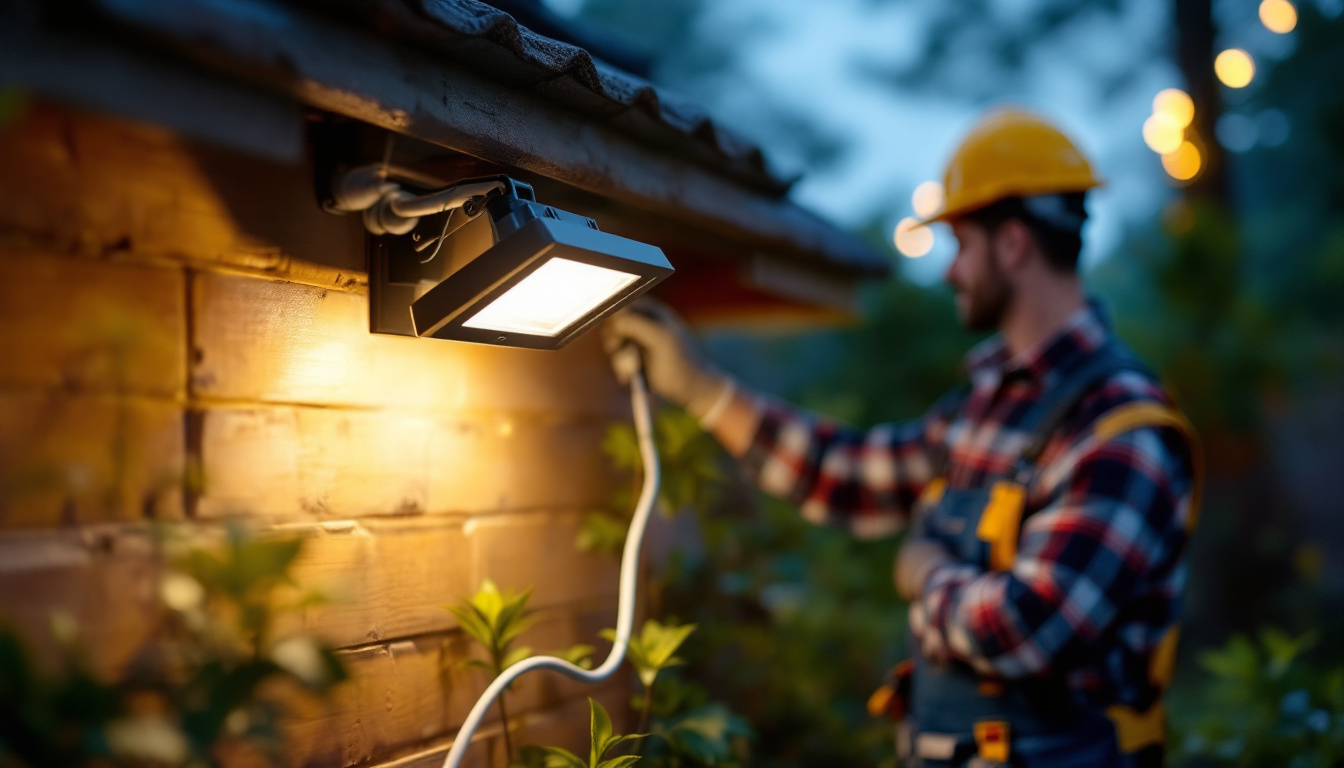
lighting contractors play a crucial role in the construction and renovation industries, providing essential services that enhance both functionality and aesthetics. With the increasing emphasis on sustainability and energy efficiency, the integration of solar technology into lighting solutions has become a significant trend. This article explores cost-saving strategies for lighting contractors, focusing on solar energy and innovative lighting solutions that can enhance profitability while promoting environmental responsibility.
Solar energy has gained traction as a viable alternative to traditional electricity sources. This shift is driven by advancements in solar technology, decreasing costs, and rising awareness of environmental issues. For lighting contractors, understanding the benefits and applications of solar energy is essential for staying competitive in the market.
Solar technology harnesses sunlight and converts it into usable energy. Photovoltaic (PV) cells are the primary components of solar panels, capturing sunlight and generating electricity. For lighting applications, solar-powered fixtures can significantly reduce energy costs and reliance on grid electricity. This technology is particularly beneficial for outdoor lighting, where long cable runs and trenching can be costly and labor-intensive. Moreover, innovations such as solar batteries have enhanced the functionality of solar lighting systems, allowing them to store energy for use during cloudy days or at night, thereby increasing their reliability and efficiency.
Incorporating solar lighting solutions offers numerous benefits. First, it provides a sustainable alternative that reduces carbon footprints. Second, solar lighting can lower operational costs, as it eliminates the need for electricity from the grid. Additionally, solar fixtures often require minimal maintenance, leading to long-term savings for both contractors and clients. Beyond financial advantages, solar lighting enhances safety and security in public spaces. Well-lit areas deter crime and improve visibility for pedestrians, making communities feel safer. Furthermore, the aesthetic appeal of solar lights, which come in various designs and styles, allows for creative integration into landscapes, parks, and urban environments, contributing to a more vibrant and inviting atmosphere.
Implementing cost-saving strategies is essential for lighting contractors looking to enhance their profitability while delivering high-quality services. This section outlines several effective approaches that can be adopted.
One of the most straightforward strategies for cost savings is to embrace energy-efficient lighting products. LED technology has revolutionized the lighting industry, offering longer lifespans and lower energy consumption compared to traditional incandescent and fluorescent bulbs. By promoting LED solutions, contractors can help clients save on energy bills while also reducing the frequency of replacements.
Moreover, energy-efficient products often qualify for rebates and incentives from utility companies, providing additional financial benefits for both contractors and clients. Staying informed about available programs can enhance the value proposition offered to customers. Additionally, educating clients about the environmental benefits of energy-efficient lighting can foster a sense of responsibility and encourage them to make sustainable choices, further solidifying the contractor’s reputation as a forward-thinking professional.
Effective inventory management is crucial for minimizing costs. By analyzing sales trends and customer preferences, lighting contractors can optimize their inventory levels, reducing excess stock and associated carrying costs. Implementing just-in-time inventory systems can help ensure that products are available when needed without incurring unnecessary expenses.
Additionally, establishing strong relationships with suppliers can lead to better pricing and terms. Negotiating bulk purchase discounts or exploring consignment options can further enhance cost savings. Utilizing inventory management software can also provide real-time insights into stock levels, helping contractors make informed decisions about reordering and product selection. This proactive approach not only minimizes waste but also ensures that contractors can quickly respond to client needs, thereby improving customer satisfaction and loyalty.
Utilizing technology for project management can streamline operations and reduce costs. Software solutions designed for the construction and lighting industries can help contractors manage schedules, budgets, and resources more effectively. By improving project visibility and communication, contractors can minimize delays and avoid costly overruns.
Furthermore, adopting tools for estimating and bidding can enhance accuracy, ensuring that contractors provide competitive quotes while maintaining profitability. Investing in technology can yield significant long-term savings. Additionally, incorporating mobile applications can facilitate on-site communication between team members, allowing for real-time updates and adjustments. This level of connectivity not only enhances efficiency but also empowers contractors to address issues promptly, ultimately leading to smoother project execution and happier clients.
Integrating solar solutions into lighting projects can elevate a contractor’s offerings and attract environmentally conscious clients. This section discusses practical ways to incorporate solar technology into lighting installations.
Before proposing solar lighting solutions, contractors should assess the suitability of the site for solar installations. Factors such as sunlight exposure, shading from trees or buildings, and the orientation of the installation area play a critical role in the effectiveness of solar fixtures. Conducting a thorough site analysis can help determine the feasibility and potential energy savings of solar lighting.
Additionally, understanding local regulations and permitting requirements for solar installations is essential. Compliance with these regulations can prevent delays and additional costs during the project. It is also beneficial to consider the local climate, as areas with more consistent sunlight will naturally yield better performance from solar fixtures. Seasonal variations in daylight hours can impact energy production, so evaluating the site throughout different times of the year can provide a comprehensive understanding of its solar potential.
Educating clients about the benefits of solar lighting can help facilitate decision-making. Providing clear information on energy savings, environmental impact, and potential return on investment can empower clients to choose solar solutions confidently. Visual aids, such as case studies and demonstrations, can further illustrate the advantages of solar lighting.
Moreover, addressing common misconceptions about solar technology, such as performance in cloudy weather or the longevity of solar fixtures, can alleviate concerns and build trust with clients. It is also important to highlight the low maintenance requirements of solar lighting systems, which can be a significant selling point for clients looking for sustainable yet hassle-free solutions. By showcasing the durability and technological advancements in solar technology, contractors can assure clients that these systems are not only eco-friendly but also reliable and cost-effective over time. Additionally, discussing potential incentives, such as tax credits or rebates for solar installations, can further entice clients to consider solar options as part of their lighting projects.
Understanding financial incentives and rebates available for solar lighting installations can significantly enhance the appeal of these solutions. This section explores various programs that can benefit lighting contractors and their clients.
Many governments offer incentives to encourage the adoption of renewable energy technologies, including solar lighting. Federal tax credits, state rebates, and local grants can help offset the initial costs of solar installations. Lighting contractors should stay informed about available programs and communicate these opportunities to clients, making solar solutions more financially attractive.
Additionally, some states have established Renewable Portfolio Standards (RPS) that mandate a certain percentage of energy to come from renewable sources. Understanding these regulations can help contractors position solar lighting as a compliant and forward-thinking choice.
Utility companies often provide rebates for energy-efficient lighting solutions, including solar-powered fixtures. These rebates can significantly reduce the upfront costs of installations, making them more accessible for clients. Lighting contractors should research local utility programs and incorporate these incentives into their proposals to enhance the value of their offerings.
Effectively marketing solar lighting solutions is essential for attracting clients and driving sales. This section outlines strategies for promoting solar offerings to potential customers.
In today’s digital age, a strong online presence is vital for reaching potential clients. Lighting contractors should invest in a professional website that showcases their solar lighting solutions, including project portfolios, testimonials, and educational content. Search engine optimization (SEO) strategies can help improve visibility and attract organic traffic.
Social media platforms also provide valuable opportunities for engagement. Sharing success stories, informative articles, and industry news can position contractors as thought leaders in the solar lighting space.
Building relationships with other professionals in the renewable energy sector can lead to valuable referrals and partnerships. Collaborating with solar panel installers, architects, and energy consultants can create a comprehensive service offering that benefits clients. Networking at industry events and trade shows can also enhance visibility and credibility.
As technology continues to evolve, the solar lighting industry is poised for significant advancements. Staying informed about emerging trends can help lighting contractors remain competitive and innovative.
The integration of smart technology into solar lighting solutions is becoming increasingly popular. Smart lighting systems allow for remote control, scheduling, and energy monitoring, enhancing convenience and efficiency. Lighting contractors should explore options for incorporating smart technology into their solar offerings, appealing to tech-savvy clients.
Furthermore, the ability to collect data on energy usage and performance can provide valuable insights for optimizing installations and improving customer satisfaction.
Ongoing research and development in solar panel technology are leading to increased efficiency and reduced costs. As solar panels become more efficient, the feasibility of solar lighting solutions in various applications will expand. Lighting contractors should stay abreast of these advancements to offer the latest and most effective solutions to clients.
Incorporating solar energy into lighting solutions presents a wealth of opportunities for lighting contractors. By embracing energy-efficient products, optimizing inventory management, and leveraging technology, contractors can enhance profitability while promoting sustainability. Understanding financial incentives, effectively marketing solar offerings, and staying informed about future trends will further position contractors for success in the evolving lighting landscape.
As the demand for sustainable solutions continues to grow, lighting contractors who adapt to these changes will not only thrive but also contribute to a greener future. The integration of solar technology into lighting projects is not just a trend; it is a necessary evolution that aligns with the values of modern consumers.
Ready to take your lighting projects to the next level with sustainable, cost-effective solutions? At LumenWholesale, we provide lighting contractors like you with the highest quality, spec-grade lighting products at unbeatable wholesale prices. Say goodbye to middleman markups and hello to a vast selection of reliable, high-performance lighting that meets the strictest industry standards. Plus, with free shipping on bulk orders, you can stock up on premium lighting without any hidden fees. Don’t compromise on quality or value—choose LumenWholesale for the perfect blend of affordability and convenience. Elevate your lighting game today by visiting Wholesale Lighting at the Best Value.

Discover how integrating laptop computer lights into your lighting installations can boost profitability.

Discover how lighting contractors can enhance profitability with strategic light post installations in parking lots.

Discover why flood lights with outlets are a game-changer for lighting contractors.

Discover expert insights from top lighting contractors on choosing and installing weather-tight electrical boxes.